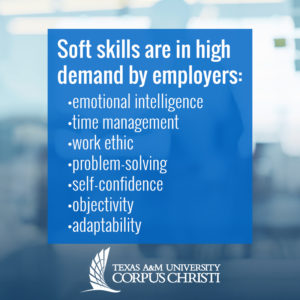
Today’s industries require more specialized professionals than ever before. Many people attend colleges and universities for between two to eight years to gain the “hard” or technical skills they will need in their careers. Coursework in the online Master of Business Administration (MBA) program from Texas A&M University-Corpus Christi (TAMU-CC) helps students learn these hard skills and understand how to apply them to the real world.
However, and at least equally as important, TAMU-CC’s comprehensive MBA program gives students many opportunities to build the “soft” skills needed to succeed in any role. Aspiring professionals in all industries must develop these transferable soft skills.
While hard skills relate directly to people’s individual professions — such as familiarity with a specific tool or computer program — soft skills pertain to one’s overall social abilities and the fundamental components of leadership, critical thinking, problem-solving and decision-making. Soft skills are so important to employers today that if competition for a job comes down to two finalists, the one with the most polished soft skills will almost always win out.
What Are Soft Skills?
The best way to illustrate soft skills is to describe their absence. Imagine an employee who consistently comes in late. They are rarely in a good mood and never seem to actually want to do any work. They get flustered when juggling multiple projects and can never solve problems without relying on a colleague or supervisor. This person also hates change. When the boss admonishes this employee for a less-than-stellar performance, they take it personally. In short, this is the exact opposite of a model employee.
Soft skills, on the other hand, describe and define the model employee. Soft skills are what professionals bring to the workplace without thinking about it. This includes emotional intelligence, communication and other interpersonal skills, time management, work ethic, problem-solving skills, self-confidence, perspective, adaptability and the ability to collaborate effectively.
Top-performing employees are always working to improve their soft skills. By sharpening their social acumen and deepening their empathy for coworkers and managers, these employees maintain a skill set they can use in any industry or company, should the need arise. This is what makes soft skills transferable, and transferable skills help professionals develop resiliency and versatility, adapting and excelling no matter their role.
Why Are Soft Skills Important?
Soft skills are essential at every level in almost every industry. As heavy machinery continues to automate menial tasks, the jobs that remain require more and more worker responsibility. Regardless which technical skills a professional needs to perform a specific task, soft skills will come into play.
The shift in the nature of available jobs is making soft skills more valuable to employers, but finding employees with well-developed soft skills is not a simple task. When a single position becomes available at an organization, hundreds — possibly thousands — of qualified individuals will submit their resumes. While college degrees and other qualifications may be enough to get a foot in the door, applicants who lack the necessary soft skills will almost certainly be passed over. Employers expect employees to use soft skills without being told to do so. Employees with little capacity for soft skills will not be a good fit within most successful company cultures.
For professionals already working within an organization, soft skills will set them apart from colleagues when it comes time for a promotion. Chances are, colleagues have the same set of hard skills; everyone works in similar capacities and has similar duties, so it stands to reason many employees are equally qualified “on paper” for a higher-level position. However, others may lack the leadership, time-management or overall work ethic a job requires. If this is the case, the professional with the soft skills that matter most will have an incredible advantage over their colleagues when vying for a promotion.
Assessing Soft Skills
Assessing one’s soft skills requires honesty and self-awareness. Working professionals must examine their work ethic and abilities, noting and acting on needed improvements. They must also commit to listening to others actively and taking responsibility if their soft skills fall short. This self-awareness is critical in the modern workplace.
There are many ways to improve soft skills, from professional development to self-help literature. For people seeking to truly enhance their worth as a professional, an online MBA program can teach both the hard and soft skills needed to succeed long-term in any business-related career.
Learn about TAMU-CC’s online MBA program.